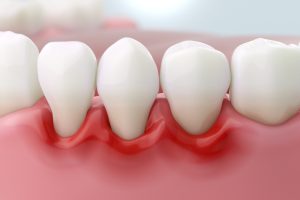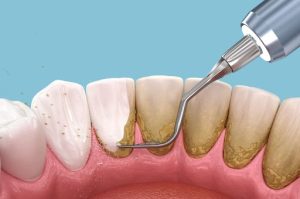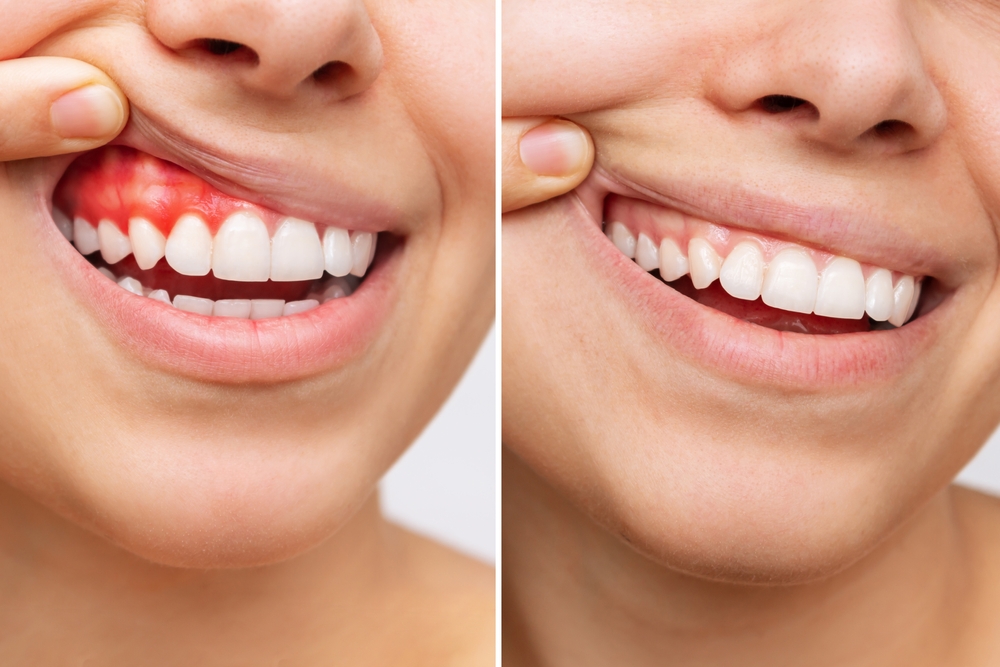Madison Dental Care, Your Partners in Gum Health
For over 35 years, Madison Dental Care has proudly served patients throughout Huntsville, Athens, Decatur, and the surrounding North Alabama communities with trusted, compassionate dentistry. Our team of three experienced dentists combines extensive knowledge with a gentle approach, ensuring every patient feels at ease while receiving the highest level of care.
From routine cleanings to advanced periodontal therapy, we provide comprehensive services all under one roof while emphasizing patient education to help you maintain lasting oral health at home. To make care as accessible as possible, we offer flexible scheduling, accept most dental insurance plans, and provide affordable payment options designed to fit your needs.

What Is Gingivitis?
Gingivitis is the mildest form of gum disease, characterized by inflammation of the gums caused by bacterial plaque buildup along the gumline. Unlike more advanced stages of periodontal disease, gingivitis only affects the gum tissue itself and hasn’t yet damaged the underlying bone or tissues that support your teeth.
When plaque—a sticky film of bacteria—accumulates on your teeth, it releases toxins that irritate your gums, causing them to become red, swollen, and prone to bleeding. While gingivitis is reversible with proper treatment and oral hygiene, ignoring these early warning signs can lead to periodontitis, which causes permanent damage to your gums and teeth.
Common Signs and Symptoms of Gingivitis
Gingivitis often develops gradually and may not cause pain in its early stages, making it easy to overlook. However, recognizing these warning signs can help you seek treatment before the condition worsens:
- Red, Swollen Gums: Healthy gums should be firm and pale pink. If your gums appear red, puffy, or swollen, this indicates inflammation.
- Bleeding Gums: One of the most common signs of gingivitis is bleeding gums when you brush, floss, or even eat certain foods.
- Persistent Bad Breath: Chronic bad breath or a bad taste in your mouth can signal bacterial buildup associated with gingivitis.
- Tender or Sensitive Gums: Your gums may feel sore or sensitive when touched or during routine oral care.
- Gum Recession: In some cases, gums may begin pulling away from the teeth, making teeth appear longer.
- Shiny Gums: Inflamed gums may develop a glossy appearance due to swelling.
If you’re experiencing any of these symptoms, don’t wait—contact Madison Dental Care at (256) 772-2626 to schedule your appointment.
What Causes Gingivitis?
Understanding the root causes of gingivitis is essential for both treatment and prevention. While plaque buildup is the primary culprit, several factors can increase your risk:
 Poor Oral Hygiene
Poor Oral Hygiene
Inadequate brushing and flossing allow plaque to accumulate along the gumline, creating the perfect environment for harmful bacteria to thrive and cause gum inflammation.
Bacterial Infections
The bacteria in plaque produce toxins that directly irritate gum tissue, leading to the redness, swelling, and bleeding characteristic of gingivitis.
Hormonal Changes
Fluctuating hormones during pregnancy, puberty, menopause, or while taking certain medications can make gums more sensitive to plaque bacteria.
Certain Medications
Some prescription medications can affect your oral health by reducing saliva flow or causing abnormal gum tissue growth.
 Tobacco Use
Tobacco Use
Smoking and using other tobacco products significantly increase your risk of gum disease by weakening your immune system and reducing blood flow to the gums.
Poor Nutrition
A diet lacking essential nutrients, particularly vitamin C, can weaken your immune system and make your gums more susceptible to infection and inflammation.
Medical Conditions
Diseases like diabetes, HIV, and other conditions that compromise your immune system can make it harder for your body to fight off gum infections.
Genetics
Some people are simply more prone to gum disease due to their genetic makeup, even with excellent oral hygiene habits.
Dental Issues
Crooked teeth, poorly fitting dental restorations, or ill-fitting dentures can make it difficult to remove plaque effectively, increasing the risk.
How Dr. Burgess, Dr. Roth, and Dr. Randall Diagnose Gingivitis
At Madison Dental Care, our experienced dentists use a comprehensive approach to diagnose gingivitis and plan your treatment:
- Clinical Examination: We carefully examine your gums for signs of inflammation, bleeding, swelling, and recession.
- Periodontal Probing: Using a small measuring instrument, we check the depth of the spaces between your teeth and gums. Healthy pockets are typically 1-3 millimeters deep, while deeper pockets may indicate gum disease.
- Medical History Review: We discuss your overall health, medications, and lifestyle factors that may contribute to your gum problems.
- Plaque and Tartar Assessment: We evaluate the amount of plaque and hardened tartar (calculus) on your teeth to determine the extent of bacterial buildup.
- X-rays: When necessary, dental X-rays help us check for bone loss or other signs of advanced gum disease.
Effective Gingivitis Treatment Options
The good news about gingivitis is that it’s completely reversible with the right treatment approach. At Madison Dental Care, we offer several effective periodontal treatment options:
Professional Dental Cleaning
The cornerstone of gingivitis treatment is a thorough professional cleaning performed by our skilled dental hygienists. This process includes:
 Scaling: Removal of plaque and tartar from above and below the gumline
Scaling: Removal of plaque and tartar from above and below the gumline- Root Planing: Smoothing of tooth roots to prevent future plaque buildup
- Polishing: Creating smooth tooth surfaces that resist plaque accumulation
Improved Oral Hygiene Routine
Our Madison dental team will work with you to develop an effective at-home oral care routine that includes:
- Proper Brushing Technique: Using a soft-bristled toothbrush and fluoride toothpaste, brush for at least two minutes twice daily, paying special attention to the gumline.
- Daily Flossing: Remove plaque and food particles from between teeth where your toothbrush can’t reach.
- Antimicrobial Mouthwash: Use a therapeutic mouthwash to help kill bacteria and reduce plaque formation.
- Semi-Annual Dental Exams: Attending routine dental exams every six months prevents unwanted decay from progressing unnoticed.
Lifestyle Modifications
Making certain lifestyle changes can significantly improve your gum health:
- Quit Tobacco: Stopping smoking or tobacco use improves circulation and helps your gums heal faster.
- Eat a Balanced Diet: Focus on foods rich in vitamins and minerals, particularly vitamin C, to support gum health.
- Manage Underlying Health Conditions: Work with your physician to control diabetes or other medical conditions that may affect your gum health.
Regular Follow-Up Care
Consistent follow-up appointments allow us to monitor your progress and prevent gingivitis from returning. Depending on your individual needs, we may recommend more frequent cleanings and checkups.
The Connection Between Gingivitis and Your Overall Health
Research shows your oral health is closely connected to your overall well-being. Untreated gingivitis and gum disease have been linked to several serious health conditions:
- Heart Disease: Bacteria from infected gums can enter your bloodstream and contribute to cardiovascular problems.
- Diabetes: Gum disease can make it more difficult to control blood sugar levels, while diabetes increases your risk of gum problems.
- Pregnancy Complications: Pregnant women with gum disease may face higher risks of premature birth and low birth weight babies.
- Respiratory Problems: Oral bacteria can be inhaled into the lungs, potentially causing or worsening respiratory conditions.
Taking care of your gums isn’t just about your smile—it’s about protecting your overall health.
Preventing Gingivitis: Tips from Our Madison Dentists
Prevention is always better than treatment. Here are our top recommendations for preventing gingivitis:
- Brush your teeth at least twice daily with fluoride toothpaste
- Floss every day to remove plaque between teeth
- Use an antimicrobial mouthwash to kill harmful bacteria
- Eat a balanced diet rich in fruits and vegetables
- Avoid tobacco products
- Limit sugary and acidic foods and drinks
- Schedule regular dental checkups and cleanings
- Replace your toothbrush every three to four months
- Manage stress, which can weaken your immune system
- Stay hydrated to help your mouth produce adequate saliva



 Poor Oral Hygiene
Poor Oral Hygiene Tobacco Use
Tobacco Use Scaling: Removal of plaque and tartar from above and below the gumline
Scaling: Removal of plaque and tartar from above and below the gumline